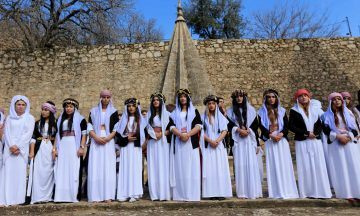Peter Frankopan in The Guardian:
 Rape, writes Christina Lamb at the start of this deeply traumatic and important book, is “the cheapest weapon known to man”. It is also one of the oldest, with the Book of Deuteronomy giving its blessing to soldiers who find “a beautiful woman” among the captives taken in battle. If “you desire to take her”, it says, “you may”. As the American writer Susan Brownmiller has put it, “man’s discovery that his genitalia could serve as a weapon to generate fear must rank as one of the most important discoveries of prehistoric times along with the use of fire and the first crude stone axe”. And yet, despite the ubiquity of rape across time and in all continents and all settings, almost nothing is written about those who have experienced sexual violence.
Rape, writes Christina Lamb at the start of this deeply traumatic and important book, is “the cheapest weapon known to man”. It is also one of the oldest, with the Book of Deuteronomy giving its blessing to soldiers who find “a beautiful woman” among the captives taken in battle. If “you desire to take her”, it says, “you may”. As the American writer Susan Brownmiller has put it, “man’s discovery that his genitalia could serve as a weapon to generate fear must rank as one of the most important discoveries of prehistoric times along with the use of fire and the first crude stone axe”. And yet, despite the ubiquity of rape across time and in all continents and all settings, almost nothing is written about those who have experienced sexual violence.
Lamb writes about her discomfort at seeing statues of military heroes in stations and town squares and the names of those who fought in battle in history books. Yet those who have suffered most have done so in silence – unmentioned, glossed over and ignored. Our Bodies, Their Battlefield provides a corrective that is by turns horrific and profoundly moving. Lamb, the chief foreign correspondent of the Sunday Times whom I have known and admired for years, is an extraordinary writer. Her compassion for those she talks to and deep understanding of how to tell their stories makes this a book that should be required reading for all – even though (and perhaps because) it is not an enjoyable experience. We meet Munira, a Rohingya who was raped by five Burmese soldiers in quick succession and was then confronted after her ordeal by finding the body of her eight-year-old son who had been shot in the back as he was running towards her. We come across a five-year-old in the Democratic Republic of Congo who had been raped, who kept repeating that they had been taken “because Mummy didn’t close the door properly”.
More here.
